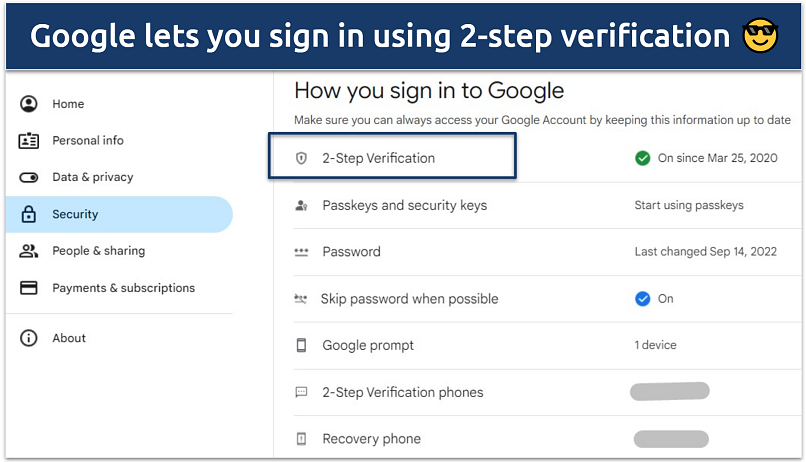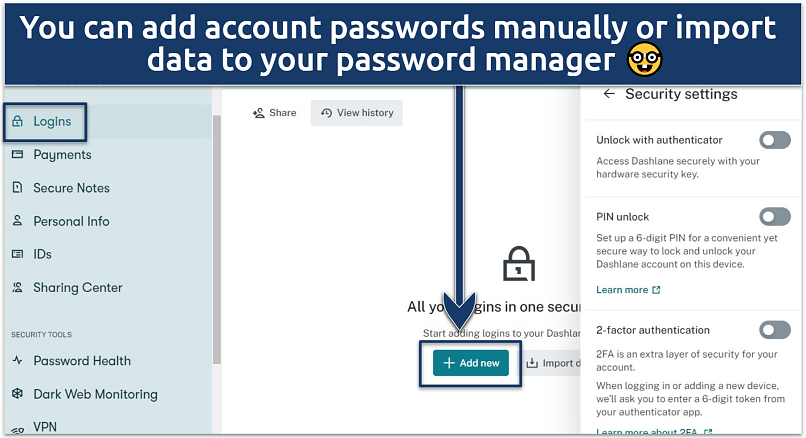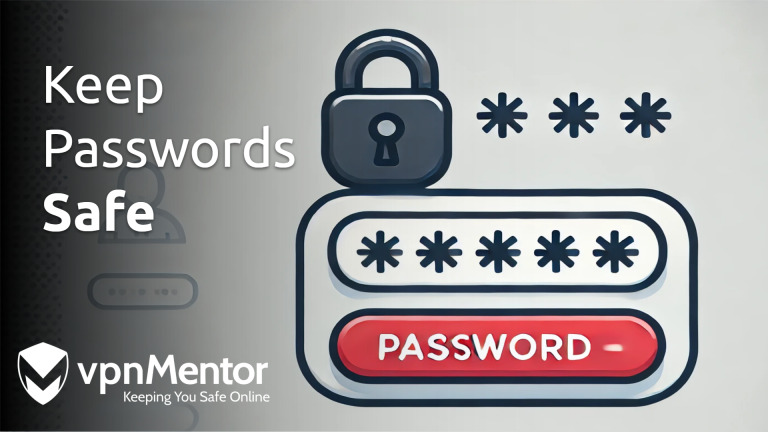How to Keep Passwords Safe: iPhone, Android, & More (2026)
A compromised password can lead to serious consequences, like financial loss, data breaches, or even harm to your business’s reputation. That's why it’s essential to learn and follow good password management practices.
How do I keep passwords safe and organized? Firstly, you need to make sure your passwords are strong. Reusing the same password — or even similar ones — across multiple accounts makes it easier for hackers to break in. Disturbingly, a Google survey revealed that 1 in 8 US adults use the same password for all their online accounts1. Once your passwords are all unique and strong, you can use a quality password manager to stay organized.
This guide will walk you through effective strategies for managing your passwords and cover how you can further secure your online accounts.
How to Keep Passwords Safe — 10 Best Ways
Keeping your passwords organized and secure is the first step to protecting your online accounts and apps. Here are some simple tips to help reduce the risk of unauthorized access:
1. Create a Unique Password
30% of IT professionals have experienced a data breach due to a weak password1. Using a strong, unique password for each account is one of the best ways to keep hackers out. Here are some practical tips to help you create secure passwords:
- Use long passphrases that are easy for you to remember but tough for others to crack. For example, a combination of random words like purpleElephantSunnyDay is both secure and memorable. 70% of weak passwords can be cracked in less than 1 second by hackers using simple brute force or credential stuffing attacks2. So, it’s best to avoid guessable passwords like 123456 or password123.
- Aim for 12 to 15 characters or more, mixing uppercase and lowercase letters, numbers, and special characters. Avoid predictable substitutions like replacing "E" with "3" — modern hackers are onto those tricks. Instead, focus on unique symbols or creative combinations.
- Try mnemonics to craft strong passwords. For example, take a phrase you’ll remember, like My first car was a Toyota in 2009!, and use the first letter of each word, mixing in numbers and symbols: Mfc?waT!i2009!.
- Avoid personal information like your birthday, family names, or favorite sports teams. Hackers can easily find this information online and use it to guess your passwords.
- Don’t use pop-culture references. Referencing the titles of popular films, bands, games, or shows might also land you in hot water. According to research from MailSuite, some of the most hacked pop-culture passwords in 2024 included the terms Superman, Blink-182, and Eminem3.
2. Turn On Multi-Factor Authentication (MFA)
Adding an extra layer of security with multi-factor authentication (MFA) is one of the smartest ways to protect your accounts. MFA requires two or more verification steps to log in, making it much harder for hackers to access your accounts — even if they get hold of your password.
The global market for MFA, valued at $19.26 billion in 2024, is expected to grow to $37 billion by 20294, highlighting its increasing importance for individuals and organizations. Here’s how you can use MFA to boost your account security:
- Authenticator apps. Apps like Google Authenticator or Authy generate time-based one-time passwords (TOTP) that refresh every few seconds, offering a dynamic and highly secure verification method.
- Hardware tokens. Devices like YubiKey provide an added layer of protection by generating unique codes or requiring physical interaction for authentication.
- Biometric authentication. Use fingerprints, facial recognition, or other biometrics for a verification step that’s unique to you and virtually impossible for hackers to replicate.
 You can sync codes across devices signed into your Google account
You can sync codes across devices signed into your Google account
3. Use a Password Manager
What is a password manager? A password manager makes it much easier to stay on top of your online security, reducing the hassle that comes with managing multiple strong passwords. Once installed, it lets you sync passwords across your devices and access your accounts securely, no matter where you are. Here’s how a password manager can help:
- Generate strong, random passwords for each account. You won’t need to create them yourself, and every password will be unique and challenging to crack.
- Store passwords in an encrypted vault that’s protected by a single master password. This way, you only have to remember one strong password to securely access all your accounts.
- Autofill login credentials on websites and apps. This saves time and reduces the risk of accidentally entering your passwords on phishing sites.
While some free options, like the password manager built into Chrome, are available, they aren’t the most secure choice. Instead, consider reliable open-source options like Bitwarden, Dashlane, 1Password, or KeePass. These work seamlessly across devices, including iPhones and Androids, and offer robust security features.
 Dashlane has an intuitive interface for managing passwords
Dashlane has an intuitive interface for managing passwords
4. Avoid Keeping Passwords on Phone Notes or Cloud Storage
It might feel convenient to save your passwords in your phone’s notes app or on cloud storage services like Google Drive, but this comes with serious security risks:
- Hackers can easily gain access. If your phone or cloud account is compromised, all your saved passwords are at risk.
- No encryption means no protection. Most note apps don’t encrypt your data, leaving passwords stored as plain text that anyone with access can read.
- Physical theft puts your passwords in danger. If your phone is lost or stolen, whoever gets it could retrieve your passwords from the notes app.
As I mentioned above, it’s better to use a dedicated password manager that encrypts your data and securely stores your passwords. This way, even if your device or account is compromised, your passwords remain protected. For added security, opt for a password manager with offline storage (no automatic cloud syncing) or one that supports self-hosting, ensuring your data stays entirely under your control.
5. Securely Back Up Your Master Passwords Offline
Your master password is the key to all your accounts and services, so it’s essential to protect it from theft or forgetfulness. Here’s how you can safely back it up offline:
- Write it down and store it securely. Physically write down your master password and recovery codes, then keep them in a secure location like a safe or locked drawer. This way, you’ll still have access if you forget your master password or lose your device.
- Back up your password vault to offline storage. Use an encrypted USB drive or external hard drive to periodically save a backup of your password vault. Make sure the tools you use offer encryption to keep your data safe.
- Create offline encrypted volumes. Use tools like VeraCrypt or PeaZip to store your password vault data in encrypted volumes. This adds an extra layer of security, ensuring your data stays protected even if the storage device is lost or stolen.
6. Be Cautious With Suspicious Links
Phishing scams are a common tactic hackers use to trick you into sharing sensitive information by mimicking legitimate websites or communications. To stay safe, follow these tips when handling links:
- Spot the signs of phishing. Watch out for emails or messages with strange greetings, grammar mistakes, an urgent tone, or questionable links. Scammers often disguise their emails to look like they’re from trusted sources to trick you into clicking.
- Check the URL before clicking. Hover over the links to see where they lead. If the URL looks odd, unfamiliar, or doesn’t match the official domain, don’t click it. Legitimate websites will always have consistent, recognizable URLs.
- Avoid links and attachments from unknown senders. Don’t click on links or download files from unsolicited emails — they could contain malware designed to steal your passwords or track your keystrokes.
7. Check for Email Breaches
It’s important to regularly check if your email address has been compromised in a data breach. Tools like Have I Been Pwned let you quickly check that.
8. Avoid Unsafe Password Practices
Did you know that an average person has roughly 100 user accounts? When it comes to storing and managing your passwords, a little extra caution can go a long way. Here's what to avoid and how to stay secure:
- Skip the plain text files. Storing passwords in Word or Excel documents is risky because these files aren't encrypted and can be easily accessed if your device is compromised.
- Don't share passwords via text or email. These methods are vulnerable to interception. Instead, use encrypted services to share sensitive information securely. Besides, never store passwords on public browsers (for example, at a library or internet café) since your credentials could be easily exposed.
- Avoid relying on memory alone. With the number of accounts most of us manage today, trying to memorize all your passwords often leads to weak, reused, or guessable ones — making your accounts more vulnerable.
While browser password storage tools offer convenience, they come with potential risks:
- If someone gains physical or remote access to your device, they might be able to view or export your stored passwords.
- Some browsers may not require extra authentication before revealing saved passwords, potentially leaving your accounts exposed.
9. Update Your Passwords Regularly
Changing your passwords every few months is a simple yet effective way to protect your accounts from potential threats. Here’s why it matters:
- Reduces the risk of old passwords being compromised. If your password has been exposed in a data breach or guessed by hackers, updating it regularly minimizes the chance of it being used to access your accounts.
- Keeps your accounts fresh. Even if you have strong, unique passwords, it's still a good habit to change them periodically to stay one step ahead of cybercriminals.
- Helps prevent password fatigue. If you’ve been using the same password for a long time, you might forget it or rely on easy-to-guess alternatives. Regular updates keep your passwords sharp and secure.
10. Consider Physical Storage
If you prefer not to store passwords digitally, physical storage can be a secure option — if done right. Here's how to do it safely:
- Write down your passwords and keep them in a safe, organized location. A fireproof safe or a hidden spot in your home can protect your passwords from theft or damage.
- Store them with important documents like your will so trusted people can access them if needed.
This method offers protection from digital breaches and ensures you can still access your passwords when necessary. Just make sure to keep your offline storage spot secure.
What to Do If Your Password Is Compromised
If you suspect that an authorized person has access to your passwords, it's crucial to act quickly and secure your accounts. Here are some actions you can take to minimize further damage:
- Change your passwords immediately. Update the compromised password and any other accounts where the same password was used. Use strong, unique passwords for each account to minimize risk.
- Enable multi-factor authentication. Activating this feature makes it impossible for anyone to access your accounts without the second factor.
- Check how deep the breach goes. Use services like Have I Been Pwned to see if your email or other accounts have been involved in breaches. This helps identify all affected accounts.
- Monitor your accounts. Regularly check your bank statements, emails, and other accounts for any suspicious activity. Early detection can help mitigate damage.
- Secure your devices. Run antivirus and anti-malware scans to detect and remove any hidden threats on your device. Also, keep your software up to date.
FAQs on How to Keep Passwords Safe
What is the safest way to store passwords?
Using a password manager is one of the safest ways to store passwords. Robust services like 1Password, Dashlane, and Keeper securely store and encrypt your passwords, preventing unauthorized access. You can quickly generate strong, unique passwords for each account, reducing the risk of breaches. Password managers also offer additional tools like dark web monitoring and password health checks to bolster your online security.
How can I keep passwords safe while traveling?
You can use a password manager service with a travel mode feature, like 1Password. This feature temporarily removes sensitive information from your device and stores it securely in the cloud, preventing unauthorized access if your device is lost or stolen. Also, install a VPN on your device to encrypt your connections on unsecured airport, cafe, and hotel WiFi. These are prime places where hackers target users.
How can I share passwords safely?
Some password managers (like Keeper and Dashlane) offer secure sharing features. You can share encrypted passwords directly through the app so that only the intended recipient can access them. Avoid sharing passwords through insecure methods like plain text, email, or text messages, which can be intercepted.
Is 2FA really necessary for all my accounts?
Yes, enabling two-factor authentication (2FA) is recommended, especially on sensitive accounts and apps. It creates an extra security barrier by requiring a second form of verification, such as a code from an authenticator app or a hardware token, in addition to your password. This significantly reduces the risk of unauthorized access, even if someone gets hold of your password.
What if I lose my phone that has my 2FA codes?
If you lose your phone with your 2FA codes, you can use backup recovery options like recovery codes, a backup authentication app, or your email to regain access. It's a good idea to keep these backups in a safe place to prevent being locked out of your accounts.
Which password manager has never been hacked?
Keeper Password Manager states on its website that it has never experienced a security breach. While other popular password managers like LastPass, Norton LifeLock, and 1Password have faced security incidents or vulnerabilities, Keeper has maintained a clean record. However, it's important to note that no software is 100% secure, and you should always follow best practices for password security regardless of the manager you choose.
How does Google keep passwords safe?
Google keeps passwords safe through encryption and multiple security measures. When you save passwords with Google, they are encrypted both during transmission and while stored on their servers using industry-standard encryption algorithms like AES. Google also employs strict security protocols, regular audits, and offers two-factor authentication for added protection.
However, it's important to note that while Google takes significant steps to secure passwords, no system is entirely foolproof, and you should still practice good password hygiene and consider using dedicated password managers for enhanced security.
Wrapping Up
How do I keep passwords safe online? Strong passwords are more powerful than many people think. A 12-character complex password takes 62 trillion times longer to crack than a 6-character one3. Additionally, approximately 50% of individual users now utilize multi-factor authentication2 — make sure you're one of them. After all, it’s all about proper password hygiene and security.


References
- https://explodingtopics.com/blog/password-stats
- https://jumpcloud.com/blog/password-statistics-trends
- https://secureframe.com/blog/password-statistics
- https://www.globenewswire.com/news-release/2024/11/18/2982518/28124/en/Multi-Factor-Authentication-MFA-Market-Forecasts-2024-2029-with-EMC-Thoma-Bravo-Thales-ASSA-ABLOY-One-Identity-Okta-Avago-and-Microsoft-at-the-Forefront-of-Developments-and-Growth.html





Please, comment on how to improve this article. Your feedback matters!